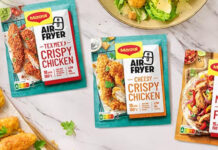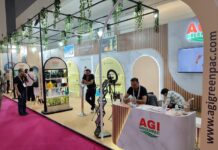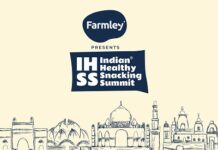
In its largest pilot to date, Carlsberg has today revealed the trial of its new Fibre Bottle, putting the bio-based and fully recyclable beer bottle into the hands of consumers for the first time. With a continued focus on evolving technology and sustainable practices, the bottle also contains beer brewed with organic and regenerative barley.
The pilot, which is vital to accelerating Carlsberg’s ambition of making the beer bottle a commercial reality, will see 8,000 Fibre Bottles being sampled in eight Western European markets – Denmark, Sweden, Norway, Finland, United Kingdom, Poland, Germany, and France. The bottles will be placed into the hands of local consumers, customers, and other stakeholders through select festivals and flagship events, as well as targeted product samplings.
Testing at this scale will give Carlsberg the opportunity to gather feedback on people’s experiences of the product, which will inform the next generation of design.
The new Fibre Bottle leverages the potential of PEF
A significant milestone for the Fibre Bottle is its plant-based PEF polymer lining, which has been developed by Carlsberg’s partner Avantium, a leading expert in renewable chemistry. PEF is made entirely from natural raw materials, is compatible with plastic recycling systems, and can degrade into nature should it end up outside national recycling systems.
Beyond its sustainable packaging benefits, PEF functions as a highly effective barrier between the beer and the fiber outer shell, protecting the taste and fizziness of the beer better than conventional fossil-fuel-based PET plastic. The outer shell of the bottle, produced by the packaging company Paboco, consists of sustainably-sourced wood fiber and is also bio-based. This shell has the added benefit of insulative properties which can help keep beer colder for longer, compared to cans or glass bottles.
Stephane Munch, vice-president Group Development at Carlsberg, says, “We are delighted to bring our new Fibre Bottle into the hands of consumers, allowing them to experience it for themselves. This pilot will serve a greater purpose in testing the production, performance, and recycling of this product at scale.”
“Identifying and producing PEF, as a competent functional barrier for beer, has been one of our greatest challenges – so getting good test results, collaborating with suppliers, and seeing the bottles being filled on the line is a great achievement.”
The bottle is 100% bio-based apart from the cap, which is currently needed to ensure the quality of the product, and together the bottle and cap are fully recyclable. Going forward, Paboco, Carlsberg, and partners in the wider Paper Bottle Community are exploring alternative fiber-based bottle caps, with a generic solution expected in 2023. Carlsberg will continue development, together with Avantium and Paboco, to arrive at a tailored 3.0 solution that is equally suitable for primary beer packaging, using this year’s consumer feedback and Paboco’s developments.
Brewed with unconventional barley
Advancements have not been limited to the bottle itself, as Carlsberg has also bottled a more sustainable brew for its 2022 consumer trials. In collaboration with barley malt supplier Soufflet, Carlsberg has brewed a beer with barley that has been cultivated using fully organic and regenerative agricultural practices. More specifically, cover crops have been grown in the organic barley fields to contribute some additional benefits of regenerative farming.
While consumers can still expect the same distinctive Carlsberg taste, the methods used to farm the barley are set to improve farmland biodiversity, enhance soil health, and increase natural carbon sequestration by the soil versus conventional farming methods.
The constant pursuit of better
Generation 2.0 of the Fibre Bottle already performs better than the single-use glass bottle in the product´s lifecycle assessment, and Carlsberg has even greater ambitions for the subsequent Generation 3.0 design. Carlsberg’s vision, supported by current projections, is for the Fibre Bottle to achieve up to 80% less emissions than current single-use glass bottles.
Thus, for every single-use glass bottle created, five Fibre Bottles could be created using the same carbon footprint. Ultimately, Carlsberg is aiming for the Fibre Bottle to achieve the same low carbon footprint as the refillable glass bottle, which is currently the best-performing primary packaging when collected and reused inefficient systems. When the Fibre Bottle is commercialized at scale, it will expand Carlsberg consumers’ choice and complement, rather than replace, existing packagings like glass bottles and cans.
Simon Boas Hoffmeyer, Group Sustainability director at Carlsberg, adds, “The progress made with our new Fibre Bottle is a testament to Carlsberg’s pioneering spirit, with a focus on making better products in every sense of the word. We’ve been working hard on this project since 2015, and aim to continue to set the industry standard by further improving the bottle’s environmental footprint and product performance. Collaboration is key and, together with our partners, we’re excited to see how research and development into sustainable packaging solutions are now becoming the norm.”
The trial precedes the global launch of Carlsberg’s ambitious ESG program, Together Towards Zero and Beyond, which will build on existing sustainability performance and momentum to take on new ambitions within sustainable agriculture and sustainable packaging, ultimately enabling Carlsberg to reduce its carbon impacts across the full value chain.
IndiFoodBev — authentic, impactful and influential
An English-language food and beverage processing and packaging industry B2B platform in print and web, IndiFoodBev is in its third year of publication. It is said that the Indian food and beverage industries represent approximately US$ 900 billion in revenues which implies more than 20% of the country’s GDP. Eliminating the wastage on the farmside can help to deliver more protein to a higher number of the population apart from generating sizable exports. The savings in soil, seeds, water, fertilizer, energy and ultimately food and nutrition could be the most immense contribution that country is poised to make to the moderation of climate change.
To improve your marketing and grow sales to the food and beverage processing and packaging industry, talk to us. Our research and consulting company IppStar [www.ippstar.org] can assess your potential and addressable markets in light of the competition. We can discuss marketing, communication, and sales strategies for market entry and growth.
Suppliers and service providers with a strategy and budget for targeted marketing can discuss using our hybrid print, web, video, and social media channels to create brand recognition linked to market relevance. Our technical writers are ready to meet you and your customers for content.
The second largest producer of fruit and vegetables in the world is continuously expanding processing capacities and delivery systems with appropriate innovative technologies. We cover product and consumer trends, nutrition, processing, research, equipment and packaging from farm to thali. Get our 2025 media kit and recalibrate your role in this dynamic market. Enhance your visibility and relevance to existing markets and turn potential customers into conversations. Ask for a sample copy of our bi-monthly in print or our weekly IndiFoodBev eZine each Wednesday.
For editorial info@ippgroup.in — for advertisement ads1@ippgroup.in and for subscriptions subscription@ippgroup.in
Naresh Khanna – 10 February 2025
Subscribe Now










